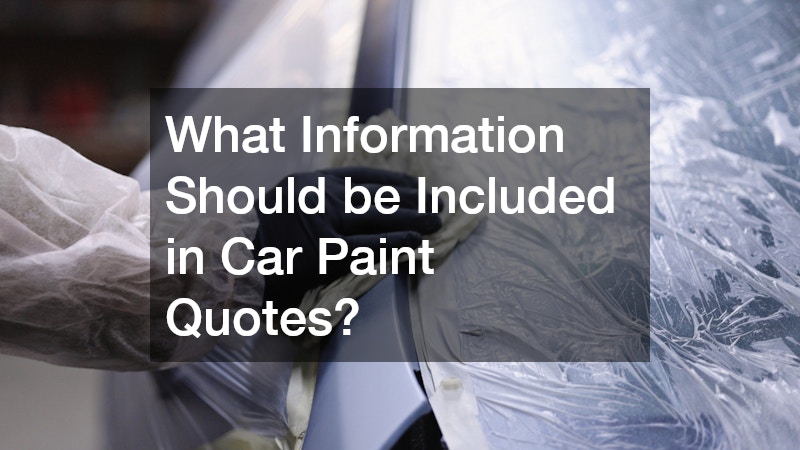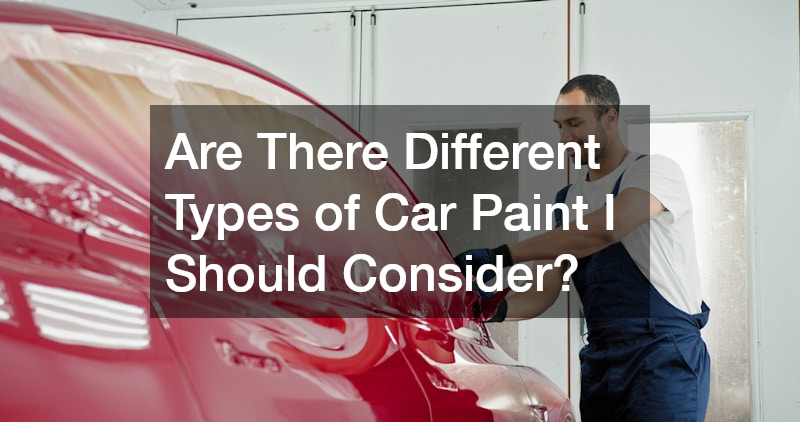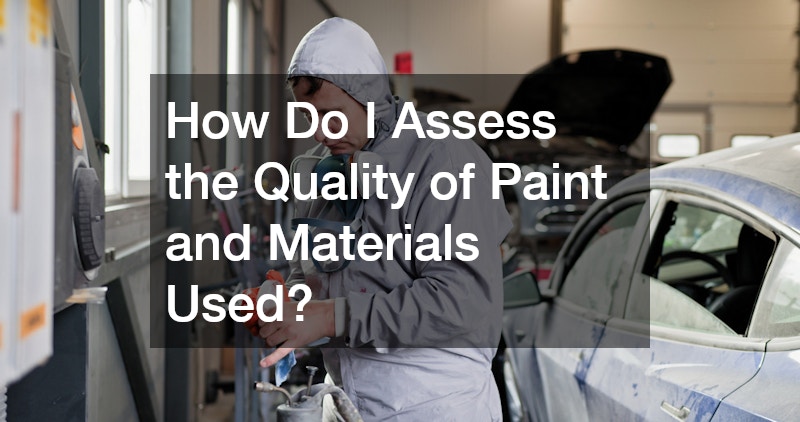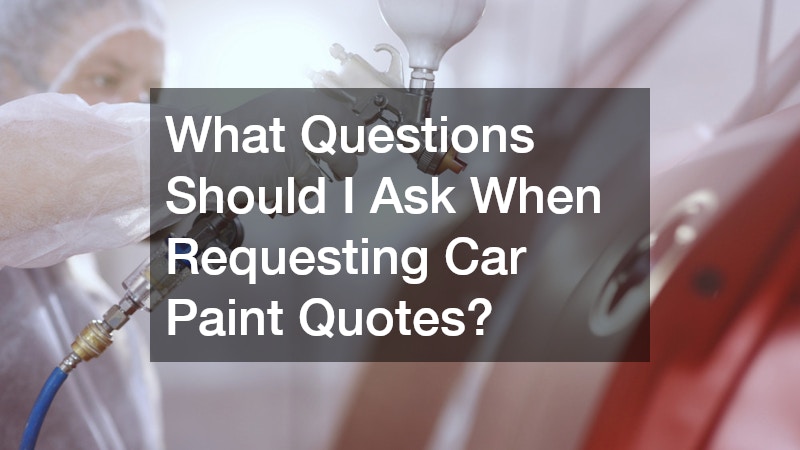
Choosing the right car paint shop isn’t just about price—it’s about knowing exactly what you’re paying for, how it affects your vehicle’s value and appearance, and what quality of service you’ll receive. Car paint quotes can vary dramatically, even for similar jobs, depending on materials, prep work, warranties, and more. A properly evaluated quote helps you avoid unnecessary upsells, low-grade finishes, or repairs that don’t last. Understanding the details in car paint quotes empowers you to make informed decisions that ensure long-term satisfaction with the final result.
Not all paint jobs are created equal, and different facilities offer a wide range of services, from basic touch-ups to comprehensive resprays. Some may include surface repairs and powder coating, while others quote only for paint application, leaving essential prep work as an added charge. Looking beyond the final figure and diving into the components of a quote can uncover hidden costs or reveal value-added services like collision repair or trailer repair.
This guide will walk you through the most important elements to look for in car paint quotes. Whether you’re dealing with a minor dent, planning a full colour change, or need related services like diesel repair or auto glass replacement, knowing how to decode a quote can save time, money, and stress.

What Information Should be Included in Car Paint Quotes?
When reviewing a car paint quote, it’s essential that the document outlines the full scope of work. This includes not only what will be painted but how the job will be approached—whether it’s a single panel, the entire vehicle, or specific damage from a prior collision repair. The types of paint used must be clearly identified, including whether the shop is using acrylic, urethane, or specialised finishes that may also require unique curing processes like powder coating. A cost breakdown should list labour, materials, and any supplementary work like sanding, priming, or even oil tank removal in cases involving commercial or industrial vehicles.
Equally important is the estimated time for completion, which helps prevent misunderstandings and sets expectations. Some shops may work with equipment rental companies for larger jobs or hydraulic power tools for advanced prep work, so these costs may be included. Warranty terms should also be itemised, outlining coverage for fading, peeling, or cracking. A reliable quote will address these elements transparently, offering peace of mind and a framework for comparing different providers effectively.
How Can I Compare Car Paint Quotes Effectively?
Effectively comparing car paint quotes involves more than scanning the bottom line. Start by evaluating the detailed components included in each quote. Check for consistency in what’s being offered—some may include essential prep work while others list it as an extra. Be sure to understand quality levels between quotes. One may use higher-grade paint that offers better durability and finish, while another might cut corners with cheaper materials. Knowing whether a shop uses metal rolling or high-end finishing equipment could justify a higher price.
Additional services like auto glass replacement or trailer repair might be bundled in, so be clear about what you need. Hidden costs are common—some shops may charge extra for sanding, masking, or applying multiple coats. Use side-by-side comparisons, and consider making a spreadsheet to organise details like turnaround time, warranty coverage, and brand of paint. This method helps eliminate ambiguity and ensures you’re making a decision based on value and not just price. Don’t overlook the need for support services like equipment rental for oversized projects or even diesel repair if the job involves commercial vehicles.
What Influences the Cost in Car Paint Quotes?
Several key factors influence the cost of a car paint quote, starting with the type and quality of paint selected. Urethane and basecoat/clearcoat systems, for example, tend to be more expensive but offer superior results. Vehicle size and condition also significantly affect pricing—a compact car with minor damage will cost far less to paint than a large SUV with rust or body dents. Labour costs are another major variable. Highly skilled technicians often charge more, but they bring precision and experience, especially when dealing with complex repairs like those needing hydraulic power or metal rolling.
Location plays a role, too. Urban areas with higher rent and utility expenses may inflate prices to cover facility overheads. Additionally, seasonal demand can drive up costs—many people seek repainting in spring and summer, leading to busier schedules and premium pricing. Lastly, the inclusion of support services like collision repair or oil tank removal in commercial vehicles can further increase the total. Understanding these cost drivers helps you evaluate whether the quote is fair and reflective of the value provided.

Are There Different Types of Car Paint I Should Consider?
The type of paint used significantly impacts the look, longevity, and cost of a paint job. Acrylic paints are affordable and easy to apply, often favoured for budget-conscious customers. Urethane paints are more durable and resistant to UV rays and chemicals, making them ideal for everyday vehicles. Enamel paints, while less commonly used today, still serve as a reliable option for classic car restorations due to their high gloss finish. More advanced options include basecoat/clearcoat systems, which offer enhanced depth and protection, albeit at a higher cost.
Specialty finishes like metallic, pearlescent, or matte paints require more skill to apply and often involve additional steps such as powder coating or precision colour matching. These choices can also affect post-paint care needs and future repair compatibility. Depending on your car’s use—daily driver, show car, or work vehicle requiring diesel repair—you’ll want to match paint type with practical requirements. Understanding your options helps you avoid being oversold or undersold on the finish that suits your vehicle best.
How Important is the Reputation of the Auto Paint Shop?
A shop’s reputation can make or break your car paint experience. Start by reading reviews and testimonials online. Patterns in customer feedback often reveal consistent quality—or a lack thereof. Certifications and accreditations from industry bodies are strong indicators of a shop’s commitment to quality and professionalism. Look for proof of experience, especially in complex services like fuel tank painting, collision repair, or trailer repair, which demand a high degree of precision.
Years of operation also matter; a well-established shop is likely to have refined its processes and invested in quality tools such as hydraulic power systems or spray booths with advanced filtration. Don’t hesitate to ask for examples of previous work. Photos and case studies can showcase consistency in quality, finish, and attention to detail. Lastly, membership in professional associations can signal adherence to industry best practices. A respected shop is more likely to stand behind its warranty and honour any service issues post-paint, giving you peace of mind.
What Are Common Upsells to Watch for in Car Paint Quotes?
When reviewing car paint quotes, be cautious of upsells that may inflate your final bill without delivering proportional value. Paint protection coatings are frequently offered, promising long-lasting shine and resistance to weather. While beneficial, ensure you truly need them. Undercoating is another common add-on, especially marketed for vehicles in wet or snowy climates. Similarly, rustproofing might be offered even when it’s not essential, especially on newer models or vehicles that don’t face harsh conditions.
Detailing packages can be appealing but may duplicate services already included in the base paint job. Be wary if these are offered without clear explanations. Additional prep work may also be quoted at a premium—things like extra sanding, masking, or disassembly. Ensure these are actually necessary. Some shops will even suggest unrelated services such as auto glass replacement or fuel tank touch-ups. While these may be legitimate, always assess their urgency and relevance before agreeing. A well-informed consumer can distinguish between valuable services and inflated costs.

How Do I Assess the Quality of Paint and Materials Used?
Assessing paint quality goes beyond brand names. Reputable shops will disclose the brands they use—high-end options are typically more durable, fade-resistant, and visually appealing. Durability and finish matter, particularly for vehicles exposed to harsh conditions. Look for paints that offer protection against environmental elements like UV rays, acid rain, and road salt. Advanced coatings such as powder coating or multi-stage finishes offer superior protection and longevity.
Accurate colour matching is crucial, especially for touch-ups or partial repainting. Modern facilities use digital colour matching systems to achieve near-perfect results. This becomes vital for insurance-covered work or leased vehicles. Also, ask about any technological advances used in application processes. For example, robotic sprayers or vacuum-assisted spray booths ensure even coverage and minimise waste. Some providers may include health-conscious or environmentally safe materials, appealing if you’re concerned about sustainability. Whether your job involves trailer repair or surface refinishing around a fuel tank, the quality of materials can drastically influence the outcome.
Do Car Paint Quotes Include Surface Preparations?
Surface preparation is often one of the most critical steps in a successful paint job. A comprehensive quote should include thorough cleaning, sanding, and any required surface repairs before painting begins. This might involve dent repair, rust removal, or even services like oil tank removal if dealing with industrial vehicles. Priming is also vital to ensure the new paint adheres properly and delivers a smooth, uniform finish.
The shop should evaluate and document all prep work requirements ahead of time. This may involve visual inspections or even using specialised tools to detect surface flaws. Any quote that skips over this step is likely cutting corners, which will affect the durability and appearance of the final coat. Facilities that invest in quality prep protocols—including hydraulic power tools and advanced sanding systems—are more likely to deliver professional results. The quality of prep work has a direct impact on the final result, influencing how long the paint will last and how good it looks.
How Does Warranty Affect Car Paint Quotes?
Warranties are often the deciding factor between similar quotes. Quality shops offer warranties that cover defects such as peeling, flaking, or premature fading. Understanding what’s included is vital. Some warranties only apply to specific conditions or mileage limits, while others may void coverage if certain post-paint care procedures aren’t followed. Duration can range from a few months to a lifetime, depending on the paint type and shop confidence.
Make sure to understand the claims process—does the shop handle warranty repairs in-house or outsource them? A reliable provider will walk you through the coverage, limitations, and claim-filing steps. Also, compare how different providers structure their warranties. One shop might cover the entire vehicle, while another offers panel-specific protection. Knowing these differences helps you weigh risk versus reward. Especially when related services like auto glass replacement or diesel repair are bundled into the quote, clear warranty terms can safeguard your investment.

What Questions Should I Ask When Requesting Car Paint Quotes?
Before signing off on a car paint quote, prepare a list of questions to ensure you understand every detail. Ask about the specific materials being used, including paint brands and types. Clarify the cost elements, especially in complex jobs that might involve hydraulic power tools, metal rolling, or prep services like powder coating. Ask whether the quote includes related services such as collision repair or equipment rental for oversized vehicles.
Discuss insurance and liability coverage in case something goes wrong. If the vehicle needs diesel repair or auto glass replacement during the process, find out how these are handled. Request a clear timeline and make sure it aligns with your schedule. Finally, inquire about post-paint care. Knowing whether you’ll need special cleaning products or follow-up inspections can influence your decision. Asking the right questions reveals the professionalism of the provider and helps you avoid surprises down the line.
Final Thoughts on Choosing the Right Car Paint Quote
Selecting the best car paint quote is about more than cost—it’s about value, trust, and long-term satisfaction. A well-crafted quote gives you a comprehensive view of what’s included, from materials and labour to extras like fuel tank refinishing or trailer repair. It should clearly state the paint type, surface preparation steps, estimated timeline, and warranty coverage. This transparency allows you to compare options with confidence and avoid being misled by lowball estimates that cut corners.
Don’t underestimate the importance of the shop’s reputation. Verified reviews, certifications, and examples of past work are strong indicators of service quality. Be wary of common upsells and always assess the necessity of added services like powder coating or auto glass replacement. Quality surface prep, modern application techniques, and trusted materials all contribute to a lasting finish. Whether you’re maintaining a daily driver or revitalising a fleet with diesel repair and hydraulic power systems, a thorough quote is your roadmap to success. Take the time to ask the right questions and choose a provider that prioritises both craftsmanship and clarity.